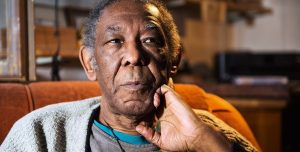Henry A. Martin, Jr. ’63 died in September 2022, in Aicha di Fiè, Italy.
(The following was provided by the Museion)
A personal obituary dedicated to the late artist Henry Martin, written by Andreas Hapkemeyer (in German). [translated using Google German-English]
A few days ago, after more than two years of suffering, the life of one of the greats of our country’s culture came to an end. He went quietly, just as he lived. The loss is significant. We are talking about Henry Martin, who was born in Philadelphia in 1942 and has lived with his wife, the artist Berty Skuber, and later his son Johnny in Völser Aicha since the late 1960s.
He had left the United States in the mid-1960s, when African Americans were demanding their rights and white students were beginning to turn against capitalism. He himself, who was able to attend a renowned university in the USA, did not seem traumatized by the racial issue. The stroke that disrupted his daily routine in early 2020 struck him on the day Trump supporters stormed the Capitol. This assault on every principle in which he believed as an American could only excite him beyond measure. We can only guess whether there is a causal connection with the accident that happened to him.
Refinedly educated and well read, Henry spoke Italian, French and German to a high standard in addition to his native English.
Henry loved art, but not the art world. That’s why he had sought the distance to New York, but then also to Milan, where he taught English literature of the Middle Ages at the Bocconi for a while.
Henry was supremely unpretentious. He was internationally known and networked. Through Henry there was a direct connection to many New York artists of the 1960s, especially those in the Fluxus environment. The Fluxers exhibition he realized in 1992 at the Museion, directed by Pier Luigi Siena, brought together a dozen of these artists: Jean Depuy, Ben Patterson, Takako Saito, Geoffrey Hendricks, Ken Friedman, Eric Anderson, Dick Higgins, Ben Vautier, Giuseppe Chiari, George Brecht… A good number of them took the opportunity to come to Bozen for the opening and thus make Bozen the location of an international artists’ meeting for a few days. A beautiful portfolio with 12 multiples was published for the exhibition and is still available in the Museion today. Unforgettable is Henry’s introduction to the catalogue, in which he writes that much has been said about Fluxus, but that what is specific to Fluxus defies a single definition. This is what one of the most internationally recognized Fluxus experts wrote. The Socratic “I know that I know nothing” was most likely the thing of this great humble one.
In 1997 he put together the exhibition “Garden of Earthly Delights” for Museion, which included works by his friend Gianfranco Baruchello as well as works by Wols, Paul Klee, Öyvind Fahlström, and others. Together with Baruchello, Henry Martin wrote an important book about Marcel Duchamp, the enigmatic grand master of the avant-garde.
Henry Martin, among other things the author of a book about the important Fluxus artist George Brecht and an infinite number of comments and introductory texts, always wrote clearly and comprehensibly, just like someone who has understood his subject and can therefore present it clearly. He also insists on clarity in the target language in the many translations he has made for Italian, German, Austrian, and American institutions and galleries over the course of his life.
In an interview he gave to Gabriele Crepaz in 2019, he said: “There is life, there is death. We’re all the same there. You just have to live. Being able to live with the fact that there are questions that have no answer.”
At one of our last meetings, as we were leaving, I jokingly asked him (half, but only half) if he hadn’t even thought of writing aphorisms about art. I would like to assist him with that. In the meantime he had become a little tired with age. And he answered me (half, maybe only half) jokingly that he would think about it. I would have really liked to have read the aphorisms of this critical art connoisseur, who recently observed from an Olympic distance, I’m sure – with great benefit. I can imagine that many others would have felt the same way. With Henry, not only a great spirit has left us, but also an infinitely friendly, patient and – yes, that too – infinitely cheerful person. A good husband, father and friend. We will invisibly miss his person and his point of view.

